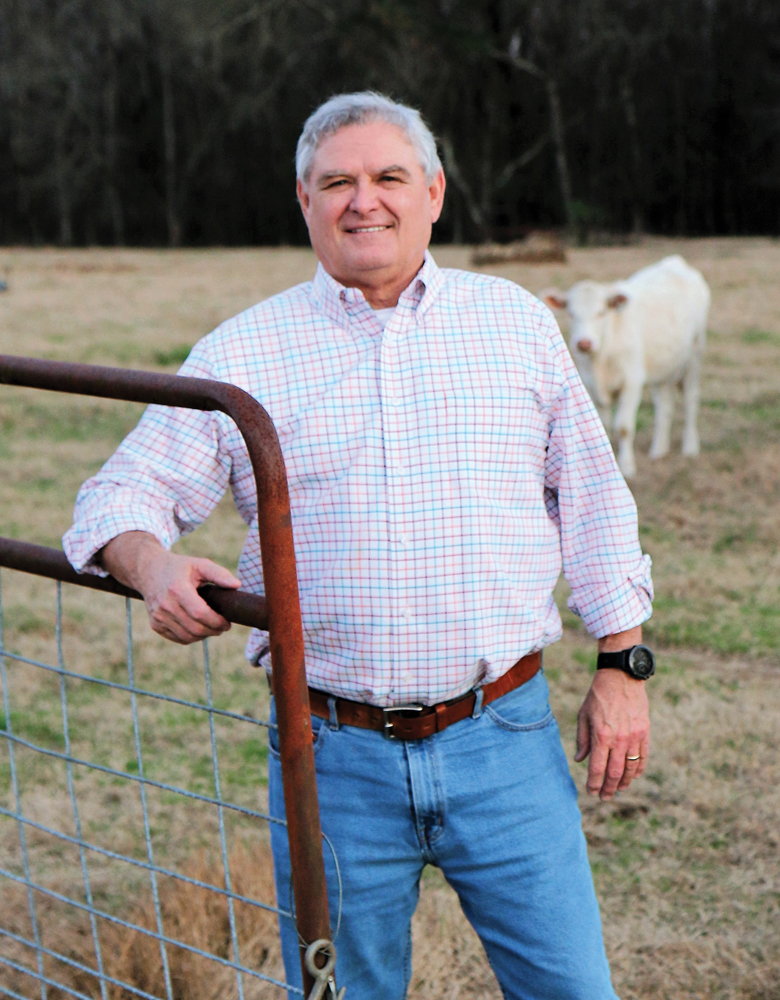
Rick Pate, who was elected Alabama’s Commissioner of Agriculture and Industries in 2018, grew up on his family’s beef and poultry farm in Lowndes County. Graduating in 1978 from Auburn University where he studied ornamental horticulture, he started his own landscaping business, Pate Landscape Co., in 1982. As if running a business wasn’t enough, he jumped into politics, first running and being elected to the town council and later mayor of Lowndesboro, where he presided over a number of municipal improvements including expansion of the water system and new sidewalks. We talked to Pate about how his background prepared him for heading up one of the state’s seven constitutional offices. –Lenore Vickrey
Why did you decide to run for statewide office?
Our parents taught us by example the importance of improving the conditions around us whether in our community, church or industry. I was at a point in my life where I was ready for a new challenge. I was approached by a farmer to run for Commissioner of Agriculture. I spoke with then Commissioner, John McMillan, and he encouraged me to run. I saw this as an opportunity to use the experience I’ve gained over the years, as a farmer, agribusiness owner and community leader to contribute to Alabama agriculture.
What’s your typical day like?
One of the most exciting aspects is that no one day is the same. I can honestly say I look forward to coming to work every day. I believe we are doing important work to protect our food supply, animal health, environment and fair commerce, while promoting Alabama-grown food and products.
My schedule changed dramatically with the onset of the coronavirus pandemic. I had spent half my time traveling around the state meeting with farmers and agribusiness groups promoting Alabama agriculture and sharing our roles in protecting consumers and farmers.
In the first few weeks of the coronavirus, we were held responsible by the U.S. Department of Homeland Security for protecting “the food supply chain” in Alabama. They declared agriculture and its employees as critical infrastructure and essential services.’ At the time, restrictions on travel were proposed and businesses ordered to close, but we believe we navigated those challenges well.
We delivered face masks and hand sanitizer to all poultry and catfish processing plants for their employees to use at home, to slow the spread of the virus. We also worked with Cal-Maine Foods, Inc. and the Alabama Trucking Association to help distribute over 280,000 eggs to Feeding America food banks and other organizations across the state. We are currently working with the governor to distribute CARES Act money equitably back to Alabama agriculture.
What has been the biggest challenge for Alabama’s agriculture industry during the current pandemic?
The ”stay at home” orders created challenges for us as we worked to keep the food supply chain operational. We saw cattle prices plummet while availability and prices of beef in grocery stores fluctuated wildly. We dealt with reduced processing capacity in our poultry industry as their facilities began to slow down due to virus outbreaks.
We continue to assure our fellow citizens that Alabama’s food supply is abundant, safe and sustainable. We will get through this together.
What’s your idea of an ideal supper with all-Alabama grown products?
It would be between a ribeye steak or fried Alabama-raised catfish. My favorite Alabama-grown fruits are fresh peaches, watermelon and strawberries. My favorite Alabama-grown vegetables include fried okra, tomatoes (with a little salt, pepper and mayonnaise), sweet potatoes and greens. A must-have for dinner is my wife’s cornbread with either Milo’s or Red Diamond tea to drink. For dessert, I’d pick blueberry pie with Blue Bell ice cream with a few Priester’s or Underwood pecans sprinkled on top.
You’ve said that by 2050 farmers will have to double food production to meet the needs of the world. How is Alabama poised to do its part?
The abundance of natural resources in Alabama uniquely positions us to continue to increase food production. We are fortunate to have a long growing season, lots of rain and a wide variety of soils. With advancements in technology, Alabama farmers keep making production gains every year while also reducing impacts on the environment. We are growing more on less land and using less chemicals than ever before. Alabama is in a position to more than meet the needs of a growing population.




